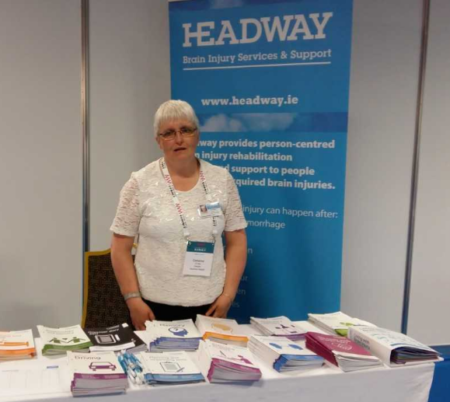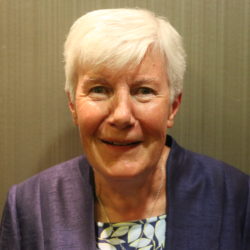My name is Catherine O Hare. I belong to the South Central Province and live in St. Leo’s Community in Carlow.
For the past eleven years I have worked with ‘Headway Ireland’ as an Information and Support Worker in the South East of Ireland, covering counties Carlow, Kilkenny, Wexford and Waterford and part of Tipperary. What does Headway do? We work with anyone over the age of eighteen who is affected by an Acquired Brain Injury. An acquired brain injury is any injury to a person’s brain that happens during their lifetime. The injury can be caused by a stroke, a bleed in the brain, an infection, a tumour, a lack of oxygen or a fall, for example.
 Catherine O Hare
Catherine O Hare
Our mission is “To bring positive change in the lives of those affected by an acquired brain injury.” How does being a Sister of Mercy influence my work? For me, it means listening with compassion and care to those who are trying to make sense of what happened to either themselves or their family member. It also means advocating on a family’s behalf for services and supports. Brain Injury does not go away so it also means being committed to working with families and individuals for as long as they want and need our assistance. To quote Catherine McAuley, “The poor need help today not next week”.
There are many aspects to my work but one part of my work that I particularly enjoy are the support groups that I run throughout the South East. I feel very strongly that peer support is so important in coming to terms with the changes that an acquired brain injury brings to people’s lives. The groups are facilitated by me, but it is led by the needs and wisdom of the group. I feel that the members of the group are the experts as they have the lived experience of brain injury. I have the facilitation skills. There is a great sense of acceptance and understanding in the groups, and lots of tips and suggestions about dealing with issues that arise. It is a precious time – sometimes with great sadness and mourning but at other times full of laughter.
Like the rest of the world, my work has had to adapt to the COVID-19 Pandemic. All group meetings and sessions with individuals have now moved to Video Conferencing, which has raised challenges for everyone. Some of the families I work with do not have access to Internet and others are unable to use the Internet or the phone as a result of their Injury – for instance due to speech difficulties or difficulty in following conversation. I have had to literally think on my feet and have learned to become more creative in how I connect with people. This requires patience as working with people with acquired brain injury, using modern technology, takes a lot of time.

To conclude, it is a privilege to work with families during times of great stress and distress and to be part of the process of supporting them to adjust to a life with an acquired brain injury. It is a journey that no one would choose, but I hope that through my interactions with individuals and families this journey is made a little easier.
Catherine O Hare
South Central Province


